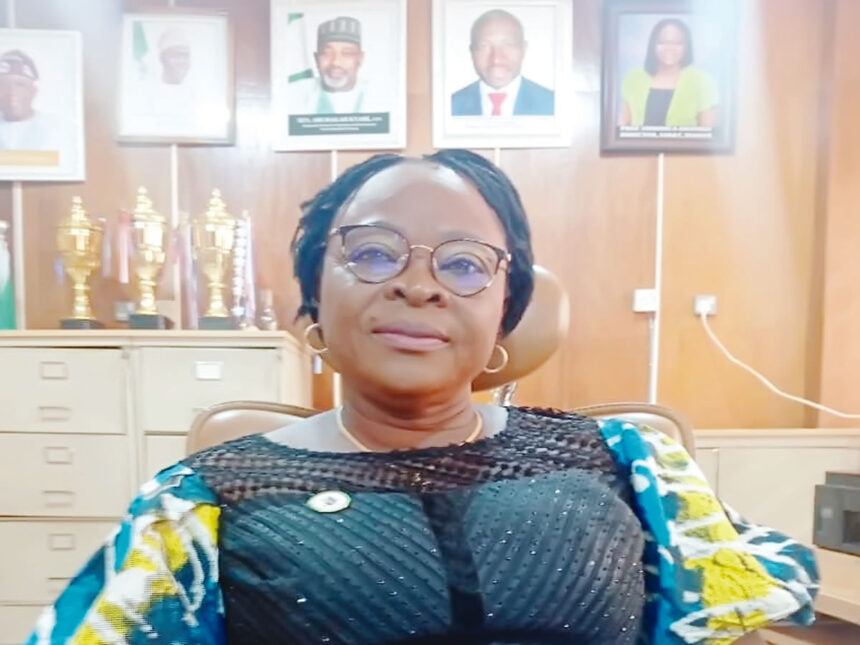Professor Veronica Obatolu during the week bowed out as the Director of the Institute of Agricultural Research and Training (IAR&T), Ibadan, amid encomiums. The professor of Human Nutrition, who served two terms in the institution, in this interview by SAM NWAOKO, relives her experience at the helm of IAR&T and as a stakeholder in the quest for food security in Nigeria.
You have served two terms of three years each. What would you say if you are to give a rundown of your tenure as the Director of the IAR&T, Ibadan?
When we came in, we had two major mandates as an agricultural research institute which are: Soil and Water Research Management and Kenaf Improvement Management. Then we also had some zonal mandates which include Triponotolerant Research Improvement (this has to do with livestock that thrive within the South West region – that’s the humid region); and mandate for improvement of maize and green legumes which include soya beans and other underutilised legumes. One of our other zonal mandates is the South West farming system research and extension research which deals with all the Southwestern region.
When we came in, one of the major challenges was with human nutrition and agriculture generally, human nutrition is a discipline that deals more with humans than the agriculture section. So I had to combine all that right from soil up till when it gets to the stomach. Putting all these things together and adding value chain from soil to the end of it was a major challenge of how do we achieve this because we have to pass through all the value chain, because we have mandate for soil, for crop, for animal and how do we add value to it. How do we nourish the processes so that humans would be able to get themselves improved from it?
If you are to talk about the quality and quantity of support you received while here, how would you describe the support you received to achieve the mandates you were given?
I think I received 100 percent support, particularly from the researches, that is the research scientists and also from academic and non-academic staff of the institute. The successes we have recorded today were because they supported me. If they didn’t, we might not have recorded any of the successes we recorded because no one person can do it alone. Everyone has to do what they are supposed to do and I think they did in the IAR&T. I thank everyone in the institute for doing their part and I am grateful to them.
On the part of the government, I think that they have also done their best to the best of their ability. Aside from untimely release of funds, which is a government issue, I think they tried their best. One of the major challenges I would want to see improved upon is the amount the government budgets for research institutes. The budgetary allocation to research institutes in Nigeria is really very low. If we are all talking about agricultural development, if we don’t put enough fund to research how can agriculture develop? I wouldn’t want to talk about the percentage of what they have done, but we have been able to use the little funds they have been able to give us adequately. We also have externally-funded projects through TETFund. It was one of our strategies. When I observed that the government is not able to give us enough funds, I had to look for external sponsors. TETFund is one, and I still refer to the support of all the people here. If they didn’t write good proposals, we will not be able to win grants. We also have FAO, OCP who also gave us support. We also collaborate with IITA and many others, bringing our resources together to be able to achieve results.
As much as you have worked, including other collaborators, food security still remains a huge challenge. It is also a recurring challenge in many parts of the world. But talking about Nigeria, where would you say Nigeria stands on the food security ladder?
On food security with regards to Nigeria, I will say it is on the low side. This is because we have a lot of challenges and dangers that we face. One of the major challenges is climate change. I already said that if we want agricultural development money need to be put into research in order to tackle some of the effects of climate change that is causing problems for us. So funding is one of them. We have not been able to do enough research to be able to really tackle our challenges.
Another thing is insecurity. It is one of the major challenges facing food security in the country. We all hear about herdsmen. We have farmers that would work on the farms and by morning, everything would have been eaten up before they get there. It happens to us also even as a research institution. You can imagine preparing hectares of land for breeder seeds which we are supposed to sell to farmers; these breeder seeds are used for foundation seeds that would help us to have enough quality seeds to sell to farmers but they are destroyed by cattle! These breeder seeds are meant for high productivity but by the time you get to the farm in the morning, everything is gone. These are the major things that affect food security in Nigeria.
Part of your mandate is kenaf and jute fibre crops. What comparative advantage have these got in the South West compared to other regions?
When we talk about soil management for instance, what we have is a national mandate. So, it is not only about the South West. What we do is soil-mapping, in doing any kind of cultivation at all, it is necessary to know the type of soil you have and to know the soil health because soil health affects the type of plant that will come in. it is necessary also to know the type of crop that you are able to produce within that area. So, that is what we do. We have done some of the soil mapping for certain states and local governments. We have not been able to cover the whole country because it is very capital-intensive. However, we have been able to take some states and some local governments and categorically, we can say that if you take this state in Taraba State, if it is within our area, this is the type of crop that you can plant there and this is the type of fertiliser that you will need there. That is about the soil mandate.
On kenaf, it is a new crop. It is an industrial crop which we have also worked on and it is our mandate crop. We have been able to release two kenaf varieties that are adaptable to all agro-ecological zones within the country. We have also been able to add value to the kenaf fibre. It is a sort of fibre that we have been able to use to replace sizer. Sizer is what they use in POP. It is mostly imported but we have been able to replace this product with kenaf fibre in the production of POP raw materials. We have been able to do that with kenaf.
We have also been able to release two varieties of maize that are adaptable to all agro-ecological zones in the South West. We’ve also been able to release three cowpeas that are of very high quality, which productivity is high. You know, if it is very good within the Southwestern region definitely it would be better in the Northern region for the cowpea. We have been able to do these as part of our targets towards food security.
Then, we talk of food and nutrition security – it has to include nutrition because if nutrition is inadequate, productivity of humans will be low and so there won’t be development. On this, we have been able to add value to increase the nutrition in what the people consume. Now we have improved yellow-flesh cassava that is commonly known as pro-vitamin cassava with soybean to be able to produce garri. We call it nutrient-dense garri. It is one of the projects sponsored by TETFund. We have also been able to develop some fertiliser that are crop-based. The fertiliser is organic and is good for tomato, palm oil and wheat. It is also an externally based programme being sponsored by OCP Africa. These are means through which we are able to achieve some set goals. Of course, we know that fertiliser has to do with soil management.
As an expert in human nutrition, how would you describe the attitude of Nigerians towards nutrition? Who are we in terms of nutrition? Is our attitude satisfactory?
I wouldn’t judge our attitude as satisfactory or not in terms of nutrition because nutrition depends on the individual. We all have different metabolism. However, when we talk about our diet, it is mainly carbohydrate and it is only of recently that people are getting the requisite awareness on being nutritionally adequate. Nowadays, regardless of the economic hardship, I can say that about 50 percent of Nigerians are now aware that it is good for us to monitor what we take in if we want to remain healthy. However, are the type of things we need accessible? Are they available? These are preventing the majority of us from meeting our nutritional needs. When we talk about hunger, the first requirement is to fill the stomach and if you cannot afford what you want, you make do with what is available.
It is believed that scholarly research results end up in the shelves. Are our policies on agriculture dependent on research or the other way round?
Policies influence research and our research informs the nature of the policies. It is like a cycle. All agricultural research institutes are supposed to carry out research according to the policies that get to the farmers who are the end users. Under our farming system research and extension, any research organisation within the Southwestern region is expected to disseminate their research to farmers who are the end users. We have ADPs through which we hold a technical review meeting monthly. There, we disseminate our research findings and get to know the problems of the farmers. The problems of the farmers – their feedback, informs the direction of our research. When their feedback informs our research, what we then do is to inform the policy-makers who would now base their policies on what we have informed them. That will now influence what they would sponsor and what they would do as policy-makers.
So, why is food still costly despite all these efforts and researches and policies?
That is as a result of the various challenges that still pervade the agricultural sector. The first of the challenges is climate change. Majority of us in the Southwestern region depend mainly on rainfall agriculture. It is only now that research is going towards irrigation, and so you will expect the challenge posed by climate change to be there. Then there is the cost of input for farming. This is another major challenge. Access to the right kind of seeds by farmers is also a major challenge. Majority of the farmers also keep forgetting that when you are keeping seeds for planting the way you store matters. These are some of the things we are doing as an institute. We train farmers on monthly basis at our Agricultural Value Addition and Entrepreneur Centre. There we train farmers the art of business, we train them on the value chain of whatever crop they cultivate. Also, think of the Nigerian population and the desire for imported foods. Nigerians prefer to buy imported paste tomato for instance whereas these things are made here. However, we must also bear in mind the issue of electricity, storage and processing, and the resultant high cost of production because of these. Then, insecurity also plays its own role. A farmer who might have planted 10 – 20 hectares of maize or other grains would get to his farm the next day and everything would have been destroyed. If you are not strong enough, you will not want to go back to farming. These factors combine to deprive Nigeria the opportunity of food security. These are affecting food security in Nigeria.
We have loads of institutions and research institutes like your IAR&T, NIFOR, National Root Crops Research Institute, Cocoa Research Institute, etc, and we are still far from food security. Why have we been unable to solve this singular problem, could it be that the government is lacking in something?
For each of the national institutions, there is a mandate. All these institutions are trying their best too. You focus on cocoa, I focus on my kenaf; you focus on cassava and others focus on their mandates. Each one of us has mandate for different things which we focus on, so there is no clash. There is always a collaboration because all the research institutes are under the Ministry of Agriculture through the Agricultural Research Council of Nigeria which coordinates all the research institutions. If, for example the National Root Crops Research Institute has a breakthrough, they bring it here because they are not in this environment. We will disseminate to the farmers within this area. So, they are all trying their best in the circumstances they have found themselves. There are a lot of factors intertwining to slow us down on our way to food security. You know how many years cocoa takes to mature but through research and development, we now have cocoa that matures in two to three years. All research institutes are recording a lot of breakthroughs.
READ ALSO: Nigeria close to achieving food security – Minister






